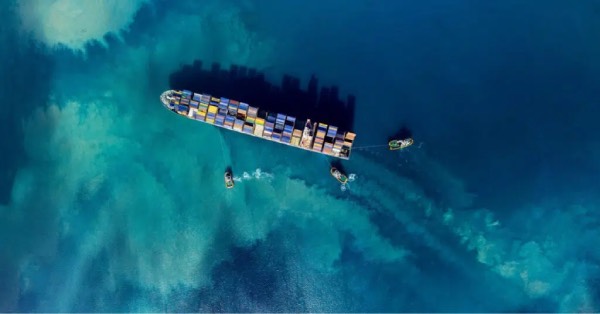Intelsat provides consistent and secure connectivity that enables real-time applications that save vessels fuel, time and money. At a time when governments and scientists alike are pushing industries to cut their carbon emissions, Intelsat’s maritime connectivity solutions streamline processes at sea to lower fuel consumption for the global shipping industry.
A smooth, operational supply chain is something many in the modern world take for granted in the era of next-day delivery. Now the pressures of the pandemic, political unrest, and labor shortages have put the supply chain in a state of upheaval. As industries push to cut emissions, bottlenecks in the supply chain are causing global shipping companies to look at innovative ways to limit their output and optimize operations.
Commercial cargo and ports will represent nearly 91% of the $45.5 billion maritime industry by 2026, according to Harbor Research. In fact, 90% of world trade flows through maritime transport, making it a linchpin in the global supply chain. Moving all these goods requires approximately 300 million metric tons of fuel each year, leading to 1 billion metric tons of carbon dioxide output. Many governments, retail companies, and the International Chamber of Shipping are aiming to dramatically reduce emissions or be carbon neutral by 2050. This puts pressure on shipping organizations to utilize greener fuels, which can be cost-prohibitive, or find other ways to lower their fuel use.
Unfortunately, the pandemic has thrown a curveball in attempts to streamline shipping and supply chain operations. As consumers shifted to purchasing online, forcing traditional retailers to become e-commerce operations, delivery directly to the home has led to overcrowded ports with more erratic shipping schedules. These delays have led to dysfunction and backlogs at ports, where cargo vessels are forced to float offshore until they can unload. In early 2022, container ships had to wait at American ports for an average of seven days before unloading, leading to further delays, wasted fuel, higher carbon output and economic loss.
Since 2008, merchant vessels have been reducing their carbon dioxide emissions through initiatives such as updating older ships, utilizing larger ships to require fewer loads, and reducing speeds to burn less fuel. However, the demand for maritime freight to ship more and more goods keeps increasing. While vessels wait for game-changing innovations, such as affordable zero-carbon fuel, they are turning to real-time applications to help reduce emissions.
Applications that help ships optimize performance and operations in real-time require the reliable “always on” connectivity that only a trustworthy satellite service can provide. Examples of these applications include route optimization and e-navigation, which helps to reduce time at sea and lower fuel consumption. Predictive maintenance, analytics, and diagnostics can catch issues while a ship is in port, optimizing its performance while at sea. Maintenance applications, along with remote diagnostics, can help prevent emergency maintenance stops.
Intelsat is a fundamental enabler of these real-time applications. We operate the world’s largest integrated satellite and terrestrial network, with global, multi-layered coverage that combines high throughput (HTS) and wide-beam geostationary satellites. Intelsat FlexMaritime is a global, secure, fully managed connectivity solution that removes the complexity of dealing with bandwidth availability, configuration and management of network infrastructure. Intelsat is the only commercial satellite operator with an independent third-party cybersecurity accreditation, ensuring protection against threats while utilizing multiple applications.
With over 10,000 terminals on the network, Intelsat FlexMaritime also offers over 30 qualified terminals that fit vessels of any size. Offered exclusively through Intelsat’s global partner network, FlexMaritime can be integrated with their innovative value-added services and world-class support to provide the perfect solution to fit any vessel’s needs and the trustworthy global network to allow them to remain safely connected during uncertain times.






































